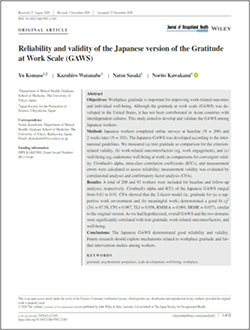#0104 Reliability and validity of the Japanese version of the Gratitude at Work Scale (GAWS)

The Japanese Version of the “Gratitude at Work Scale” is Reliable and Valid
The term “workplace gratitude” refers to a worker’s gratitude for the recognized ways in which various aspects of a job affect the worker’s life. Its two core components are gratitude for a supportive work environment and gratitude for meaningful work. Sociologists have long recognized the importance of workplace gratitude as a determinant of work-related outcomes and individual wellbeing, and they have therefore invested effort into developing various tools for quantifying it.
One valuable tool to come from such efforts is the Gratitude at Work Scale (GAWS), which is a 10-item questionnaire designed to provide a comprehensive measure of workplace gratitude. One problem, though, is that no existing studies have examined the tool’s utility in Asian countries that are characterized by interdependent cultures, which are in stark contrast to Western cultures that emphasize individuality.
To address this problem, we developed a Japanese version of the GAWS in accordance with international guidelines. We then conducted a study to determine whether the Japanese GAWS is a useful metric for workplace gratitude. For this study, we conducted an online survey of 206 Japanese workers, of whom 93 provided usable re-test data 2 weeks after first completing the Japanese GAWS.
When we analyzed our survey data, the results indicated that the Japanese GAWS achieved a high degree of reliability, meaning that respondents who completed it twice obtained similar results each time. Several statistical lines of evidence also supported the instrument’s validity, which in this context means the degree to which results on the Japanese GAWS correspond to a respondent’s level of workplace gratitude.
The results upheld the validity of a two-factor model based on gratitude for a supportive work environment and gratitude for meaningful work, and scores on the Japanese GAWS correlated strongly with good work-related outcomes, general wellbeing, and trait gratitude, which is a person’s general tendency to recognize gratitude-eliciting events and respond to them with gratitude. A detailed description of our results appears in an article recently published in the Journal of Occupational Health.
Overall, these results indicate that the Japanese GAWS is a reliable and valid tool for measuring workplace gratitude in Japanese workers. It will therefore be a valuable resource for research into the Japanese workplace.

Link to the original journal article:
https://onlinelibrary.wiley.com/doi/10.1002/1348-9585.12185
Title of the paper:
Reliability and validity of the Japanese version of the Gratitude at Work Scale (GAWS)
Authors:
Yu Komase, Kazuhiro Watanabe, Natsu Sasaki, and Norito Kawakami




